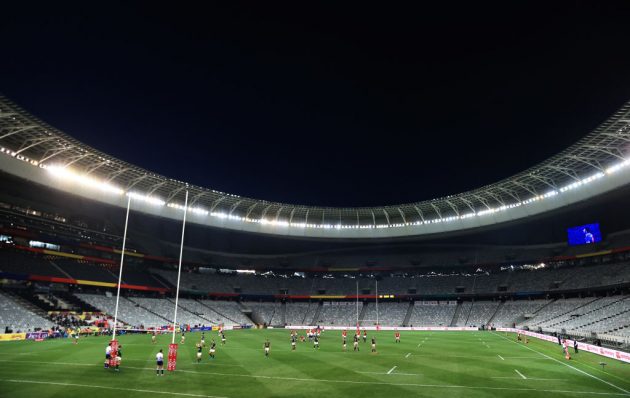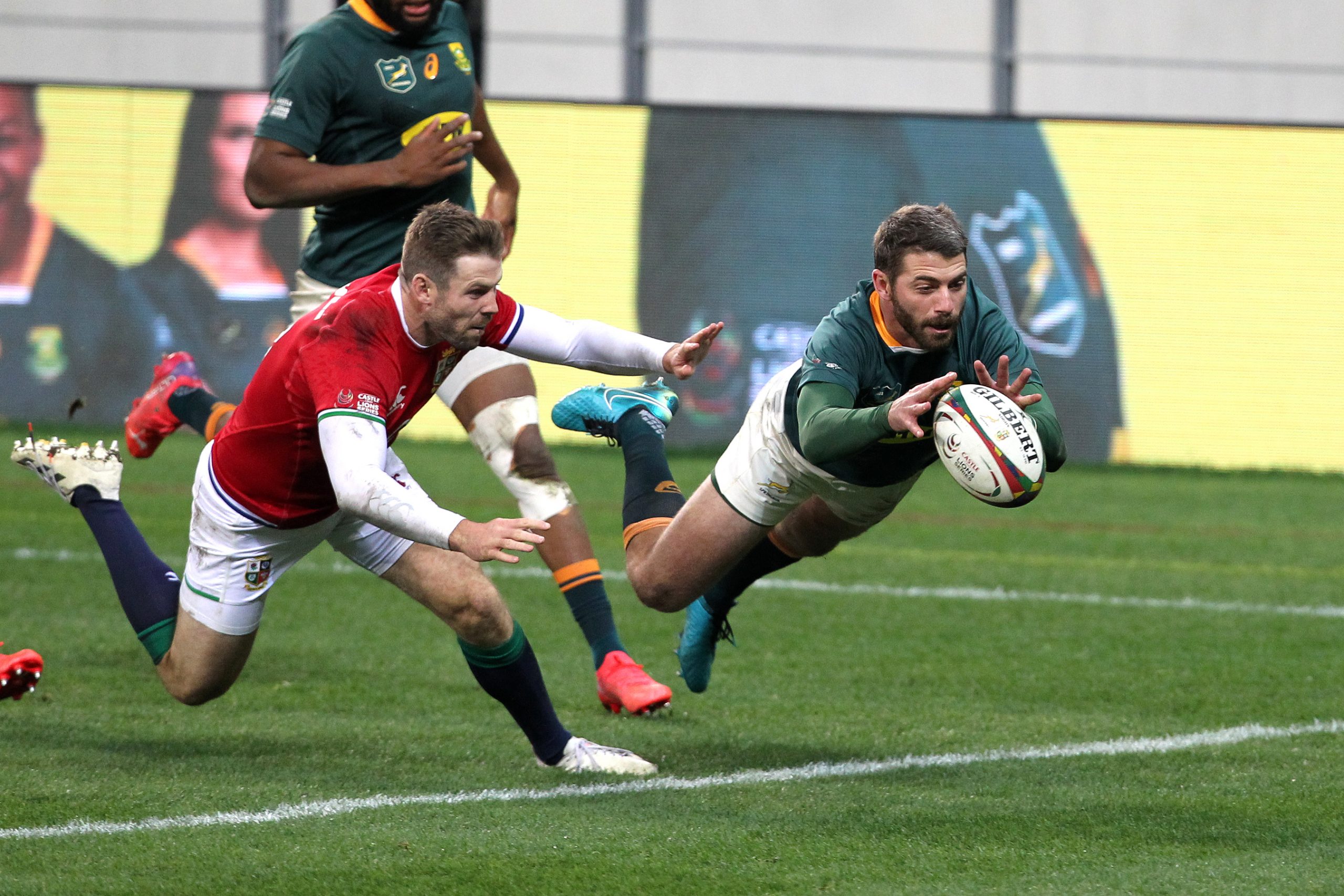Empty seats, TMO debates and roaring replacements feature in Jon Cardinelli’s latest column from South Africa
Absence of fans for Lions series dampens occasion
The big occasion that never was.
Cape Town is a rugby town. There’s a noticeable change in the atmosphere on game days, whether the local stadium is hosting a Test, a big Super Rugby fixture or the South African leg of the World Rugby Sevens Series.
Never mind the fact that the Stormers have never won a Super Rugby trophy or that South Africa last won a Test here in 2014. Before Covid-19, fans would attend local matches in their thousands – a familiar disappointment in the home team giving way to an unshakeable passion for the game on a weekly basis.
These fans were conspicuous by their absence for the first Test of the British & Irish Lions 2021 series on Saturday afternoon.
Here. We. Go. ?#LionsRugby #CastleLionsSeries #BoksvLions pic.twitter.com/qEjQiuHrLe
— British & Irish Lions (@lionsofficial) July 24, 2021
As a colleague from the UK and myself waited outside Cape Town Stadium for the results of our antigen tests, he spoke about the short journey from his hotel to the ground. During the previous tours in 1997 and 2009, the veteran tourist remembered, the Waterfront and surrounds were overrun by visiting fans in red jerseys.
I pointed to the empty spaces in the parking lot and beyond to Somerset Road. On typical game days, these spaces are teeming with fans from all walks of life.
On Saturday, however, we spotted a few people walking their dogs towards the Sea Point Promenade. At no point did it feel like the stadium was about to host the biggest rugby match since the 2019 World Cup final.
Every attempt to simulate or compensate for a lack of fans over the past year or so has failed. On Saturday, a few signs were posted at opposing ends of the Cape Town Stadium.
These messages ranged from the obvious “Our Lions hunt in packs” to the edgier “Duhan wiet jou ma jy’s hier” – an Afrikaans message asking the South Africa-born wing Duhan van der Merwe whether his mother knows that he is back in the country.
A few signs have been placed around the stadium.
This makes me miss the fans even more… #LionsSA2021 #LionsRugby pic.twitter.com/JpjrHkR4ru
— Jon Cardinelli (@jon_cardinelli) July 24, 2021
It all felt a bit contrived, though, and served as a reminder of what the series and the sport at large is missing.
It’s been a privilege to be at the ground over the past few weeks. For better or worse, the media has had the benefit of watching the contests as they are – that is rugby battles bereft of crowd participation and energy.
Upon rewatching the first Test, it’s evident how many layers have been added to give the impression that the absence of fans has not changed the game for the worse. Colourful graphics expand over the unpopulated stands. Canned cheering – which cannot be heard at the ground – punctuates each move on the field.
Again, all this serves to do is to remind us about the role that genuine fans play in creating an atmosphere and sense of occasion.
Waterboy-gate and TMO tantrums
Rassie Erasmus and Warren Gatland held nothing back in the build-up to the first Test.
The Lions coach openly questioned a couple of decisions after the fixture between South Africa A and the tourists on 14 July. Erasmus responded to Gatland’s comments in the media by highlighting a few borderline tackles by the visitors.

Warren Gatland and Rassie Erasmus chat before kick-off (Getty Images)
In the days leading up to the series-opener against the Springboks, Gatland suggested that Erasmus should carry some water if he was going to operate as the team’s waterboy during the Tests. Former referee Alain Rolland waded in with an opinion about Erasmus’s new role, yet conceded that the Boks were not breaking any rules.
Jacques Nienaber is the Boks head coach. Erasmus, as the director of rugby, is free to stand in the technical area on match day. Nevertheless, referee Nic Berry was instructed to monitor Erasmus closely over the course of Saturday’s match. As if Berry didn’t have enough to consider.
Two days before kick-off, the Lions expressed their disappointment with the decision to replace Brendon Pickerill with Marius Jonker as the TMO for the first Test.
Related: Marius Jonker stepping in as TMO for Lions Tests draws ire
The former was unable to travel from New Zealand due to Covid-19 restrictions, so the call was made to give a local TMO the responsibility.
Some in South Africa felt that the Lions pre-match comments influenced Jonker’s decisions on match day. After the game, however, Bok coach Jacques Nienaber, pointed out that Jonker had access to all the relevant angles and that he was right to disallow two second-half tries by the hosts.
? "He's lifted above the horizontal and he's deposited on the head. That has to be looked at."
Nick Mallett shares his thoughts on some of the referee decisions from yesterday's clash.#CastleLionsSeries | @MTNza
— SuperSport ? (@SuperSportTV) July 25, 2021
Lions bench explodes, Bok bomb fails to ignite
Despite the inevitable moaning about officials in South Africa, there’s no getting away from the fact that the Lions were the superior team in the second half and deserved to win the game.
MORE ON THE FIRST TEST
Lions beat Springboks in first Test
British & Irish tourists turn around 12-3 half-time…
Huge TMO calls by Marius Jonker in first Lions Test
Huge TMO calls by Marius Jonker in first…
Warren Gatland: “Next week will be even tougher”
The Lions coach is ready for Boks backlash…
The best leaders and coaches change tack over the course of big matches in an attempt to take control of the contest. The Lions got it wrong in the first half, yet managed to respond accordingly in the second. By contrast, when the Boks were put under pressure in the latter stages, they offered no significant response.

The Lions and Springboks prepare for a scrum (Sportsfile/Getty Images)
South Africa’s big tactical ploy backfired spectacularly. The Bok scrum was on top for much of the first half, with Ox Nché, Bongi Mbonambi and Trevor Nyakane troubling their opposite numbers in the front row.
It remains a mystery why all three were subbed at half-time. Steven Kitshoff, Malcolm Marx and Frans Malherbe are all world-class players, yet the Boks lost momentum after they were introduced en masse at the set-piece.
Tourists rise to the occasion
The aerial performance by the Lions in the latter stages was particularly impressive. Bok No 8 Kwagga Smith was successfully targeted, and an improved kicking and chasing display resulted in more possession and penalties for the tourists.
It remains to be seen how the Boks will respond in the second Test. Duane Vermeulen is still recovering from an ankle injury and – barring an Alun Wyn Jones-style recovery – is unlikely to wear the No 8 jersey in this series.
Willie le Roux and Kwagga Smith going for the same aerial. One needed to hang back. Communication lacking perhaps where with Vermeulen definitely would have been more assured. https://t.co/pVlqGe0LPx
— Dylan Jack (@dylmjack) July 24, 2021
Nienaber will have to decide whether Smith is the man to field those kicks – and to be fair Smith defused most of the bombs that came his way in the first half – or whether Leicester Tigers star Jasper Wiese is better suited to the task.
The composition of the Bok bench will be another big talking point in the lead up to the second Test. Perhaps Nienaber will follow Gatland’s lead and include more veterans among the reserves.
Cobus Reinach, Morné Steyn and Frans Steyn watched the recent game from the stands. It would be a shame if their game management talents went unused in what could be the series decider on Saturday.
Turf problems impact on set-piece battle
A few eyebrows were raised when it was confirmed that the Cape Town Stadium would play host to a Test between the Boks and the Lions.
The ground was built in the lead-up to the 2010 FIFA World Cup. While it’s a magnificent stadium in most respects, the pitch appears better suited to football and sevens than Test rugby.
Four tour matches have been staged at this venue over the past three weeks, and the intense scrum battles have taken a heavy toll on the turf. Indeed, there were a few instances in the Test on Saturday when the two packs were forced to move several metres infield from the original mark before resetting.
The Cape Town pitch tore up badly in the first Test – can it hold on for rest of the series? https://t.co/k72TnozxYR pic.twitter.com/fsYKLZDTh5
— Rugby World (@Rugbyworldmag) July 24, 2021
Some have suggested that the series organisers should stage at least one of the remaining two Tests at Newlands. The stadium in Cape Town’s southern suburbs may not be as modern as the one in Green Point, but the field itself has played host to some epic battles over the years.
The Lions won’t mind either way.
The tour will not move to Johannesburg as initially planned, given the high number of Covid-19 infections in the Gauteng province. All three Tests will be played at sea level in Cape Town, and ultimately the Lions won’t have to cope with the potentially crippling effects of altitude.
Download the digital edition of Rugby World straight to your tablet or subscribe to the print edition to get the magazine delivered to your door.
Follow Rugby World on Facebook, Instagram and Twitter.








